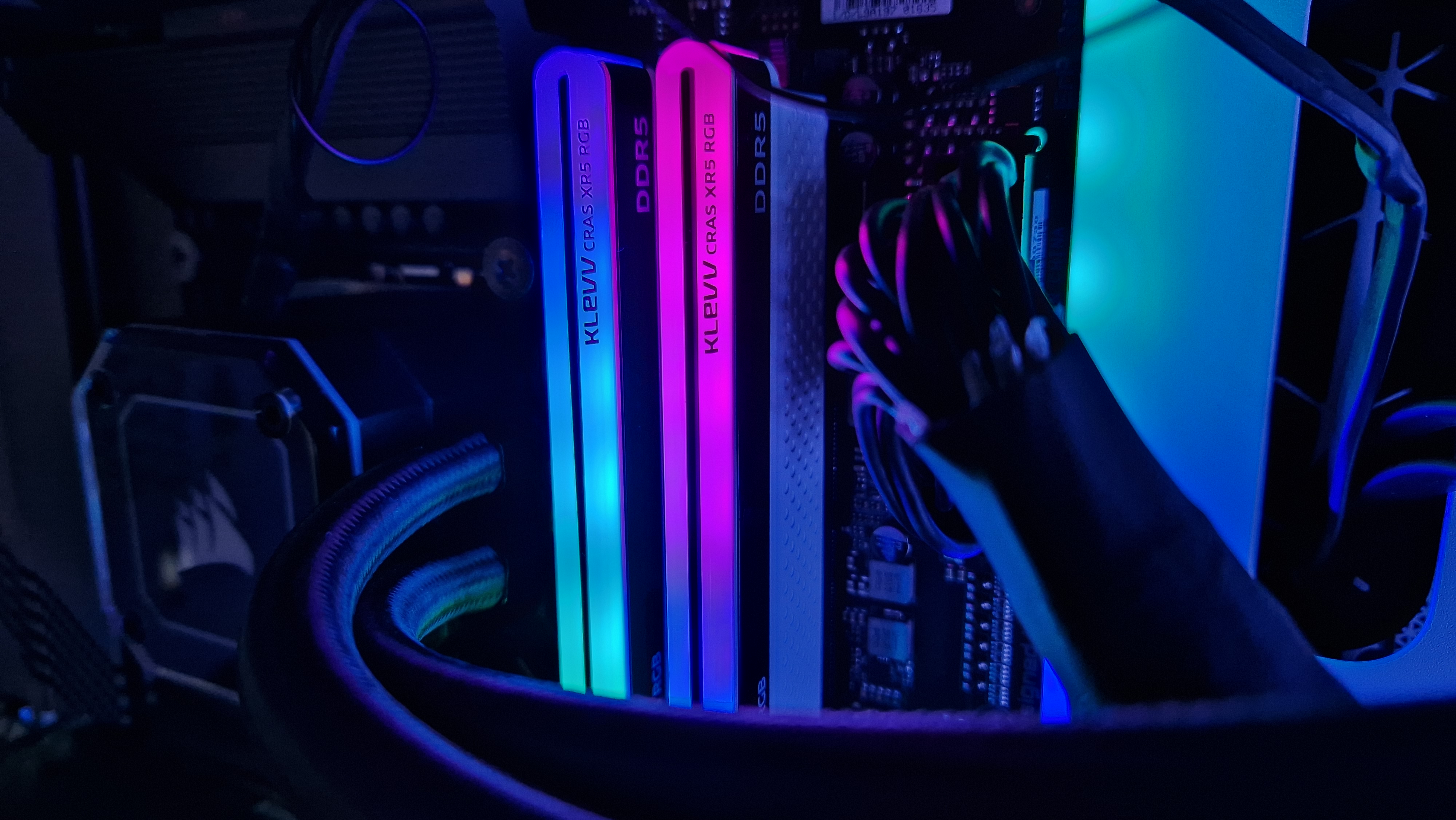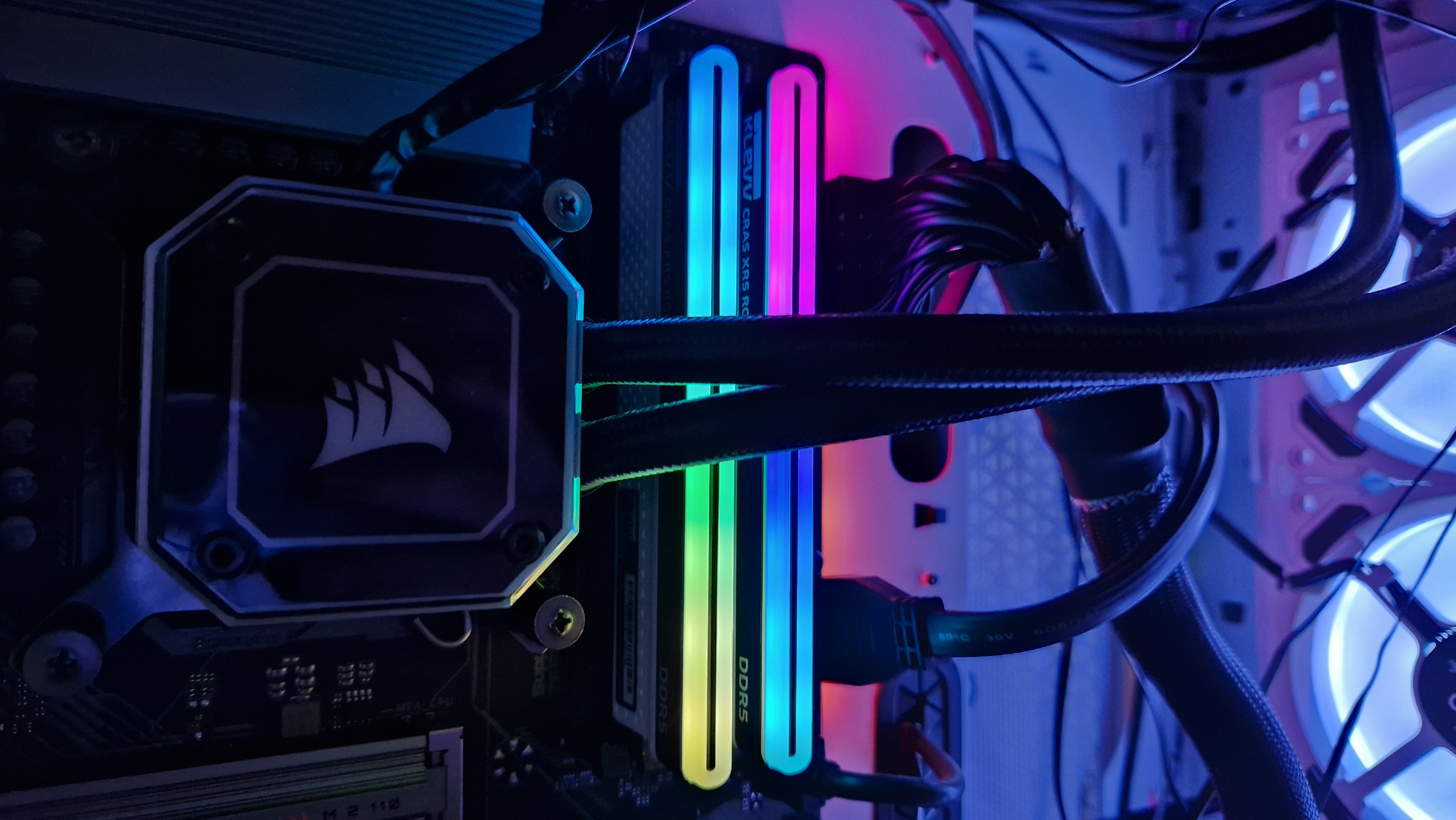
I've really enjoyed testing out Klevv's Cras XR5 RGB DDR5 RAM - mainly because of the company's origins. Klevv is a memory brand that's headed up by Essencore in Hong Kong. My dad happened to live in Hong Kong for 12 years, and I count myself lucky to call it a second home after spending a lot of my teenage years there. In fact, it's there that I learned a lot about the gaming hardware and technology I work with today.
Hong Kong's technology markets are filled to the brim with smaller brands you probably haven't heard of. Strolling through street stalls or indoor malls, you notice a lot of hardware that bears an uncanny resemblance to bigger brands and models you know, for about a third of the price. That might spark "rip-off" alarm bells in most heads, but for the most part all of those "fakes" will blow big-name rivals out of the water in terms of performance. I can't say that's the case with Klevv's Cras XR5 RGB DDR5 RAM, but for only $98.99 per 16GB DDR5 stick (£120 for two 16GB sticks in the UK), its price-to-performance ratio is unreal among the best RAM for gaming.
The speed on the box tells you this memory kit, which we tested in the form of two 16GB sticks, can reach up to 6000MHz. With our testing PC now fully equipped with a 13th Gen Intel Core i7 processor that's able to harness such insane speeds, I got to work on putting this RAM through its paces.
Design and Features
Klevv Cras XR5 DDR5 RAM makes a clear statement with its aesthetics; it's coming for Corsair's Platinum RGB DDR5 lunch. Straight away, you can see that aforementioned uncanny resemblance to a big-name model thanks to the white plastic body with a beautiful RGB light array on top. There's no accounting for taste, and I'm sure plenty of folks will take issue with the golf ball-like divots in the memory's chassis, but the RGB when installed is stunning.
The way colors blend and flow into one another is such a welcome addition to any RGB-filled gaming PC, and although looks are hardly everything when it comes to RAM, this is up there with the top-looking memory kits I've come across. As an added bonus, this lighting is controllable through Asus Aura Sync, Gigabyte RGB Fusion, MSI Mystic Light, ASRock Polychrome Sync, and even Razer Chroma.

Like a lot of DDR5 memory kits, there's the option to pay slightly more here and get an even faster set of sticks. You can also get 32GB of 6200MHz RAM with the same design, or, in a more subtle black body albeit with the same golf ball-like divots. DDR4 kits with XMP 2.0 compatibility are available too.
The memory is kept cool by an Aluminium heatsink, and built-in PMIC claims to give improved power stability and efficiency. Although we didn't push Sabrent's Rocket DDR5 into the same speed realms as we did this kit, it had a similar power management system built-in, albeit in a more humble design. As a nice bonus, you also get ECC here, which is error correction code memory - this essentially allows your RAM to detect and correct n-bit data corruption.
What's most impressive is that it's both XMP 3.0 ready, as well as compatible with AMD EXPO. When installed I found one profile in the BIOS for each type of build.
Performance

And so we come to performance. For our DDR5 RAM reviews, I like to run a small experiment to test how faster clock speeds and XMP profiles can impact gaming performance for a PC. If you aren't sure what that is, have a gander at this article that explains what XMP is, and how you can enable it.
It's long been stated that RAM doesn't impact frames per second, and while that's certainly true of DDR4, I've found that DDR5 can help to give small boosts, take strain off other areas of a rig, and even help to provide more stability to in-game performances.
The experiment is as follows; we take an entry-level GPU (an RTX 3050), and some DDR5 RAM, and we run them through some of our benchmarking games at 1080p and 1440p, with medium settings enabled. Particularly at 1440p, the GPU works pretty hard, so the test is to see how boosting RAM speeds can take strain off the processor, SSD, and GPU to improve gaming performances.

Admittedly, we do need to issue the caveat that since our first few DDR5 reviews when we benchmarked comparative scores, our testing PC was working with a 12th Gen Intel Core i7-12700K processor. We've now upgraded to the 13th Gen equivalent, which will, more than likely help with efficiency and a few in-game scores, since it's up there with the best CPUs for gaming. For that reason, the first clock speed I tested at, mainly to provide a control element, was 5000MHz, as this was the speed that PNY's XLR8 Mako DDR5 benchmarked at. From there, we could see how Klevv's memory kit performed comparatively, and bump up speeds thereafter.
So, running at 5000MHz, these were the frame rates I recorded.
As you can see there, Klevv performs much the same as PNY's XLR8 DDR5 when running at 5000MHz - and the two were virtually identical in 1080p and 1440p performances.
So that's our control test done. The speed on the box of this RAM, however, is 6000MHz - which we haven't boosted PNY's kit up to yet. So let's see how Klevv's RAM performs compared to itself when it ran at 5000MHz.
So for the most part here, this RAM was successful in giving our testing rig a frame rate boost when working with a more entry-level GPU. I can attest too, that although these aren't the biggest frame rate increases, faster clock speeds did make the frame rates more stable - particularly in 1440p when the graphics card was working harder.
The anomaly here was HUNT: Showdown, which was a bit strange. With other RAM reviews, a faster clock speed always resulted in more stable and higher frame rates for HUNT, but then again everyone has bad days.
For those interested, readings for Klevv Cras XR5 RGB DDR5 were 36-37-37-70, it uses SK Hynix format, and when clocked to 6000MHz, ran at 1.300V according to CPU-Z. While this is the highest voltage we've measured for RAM, it should be noted that this is also the highest we've boosted any DDR5 memory to since I took over testing.
Installation was nice and easy, and selecting XMP in the BIOS went without a hitch - which is exactly what you want. If I could nit-pick, I'd have liked more than one XMP/EXPO profile so that for folks that aren't as well-versed in overclocking or are a bit shyer with it, there were easily selected profiles to suit different rigs.
Should you buy Klevv Cras XR5 RGB DDR5 RAM?

When I used to shop around for technology in Hong Kong, I'd be looking for one thing - value for money. In terms of that, I'd say Klevv Cras XR5 RGB is hard to beat in the DDR5 arena. I haven't seen speeds upwards of 6000MHz for this cheap, and when you throw in the beautiful aesthetics of these sticks, it's such a strong option. There's futureproofing, style, and overall great performance to be had with Klevv's DDR5 RAM, and it's an easy recommendation from me.
I'm actually about to build myself a new gaming PC, and in all honesty, I might be pinching this memory to use in my new rig if Klevv doesn't want the sticks back. If that isn't high enough praise, I'm not sure what is.
How we tested Klevv Cras XR5 RGB DDR5 RAM
32GB of Klevv Cras XR5 RGB DDR5 RAM has been in our testing PC for a few weeks before this review, and in that time I've put it through its paces both in gaming tasks and general work. I do tend to keep lots of tabs open when I work, and with lesser RAM that can sometimes be a bit stuttery - I had no hitches here, however.
As explained up top, I took a lower-end graphics card to measure in-game performances with this memory and tested how different RAM speeds impacted frame rates in a few games. To take readings and voltage numbers, I used CPU-Z.
To read more about the ways we test the latest gaming components, have a gander at our hardware policy.
Looking for a new gaming display? Check out the best gaming monitors, the best 4K monitors for gaming, and the best ultrawide monitors.







